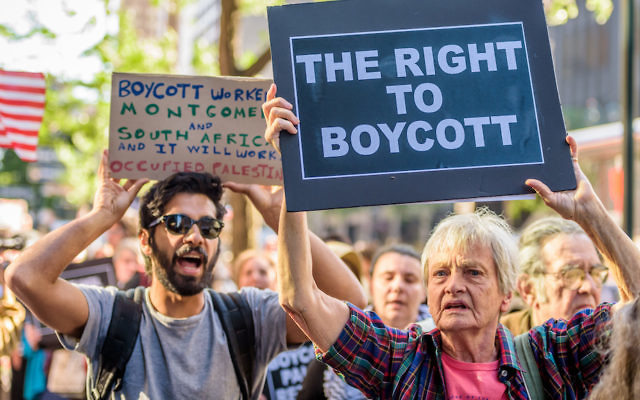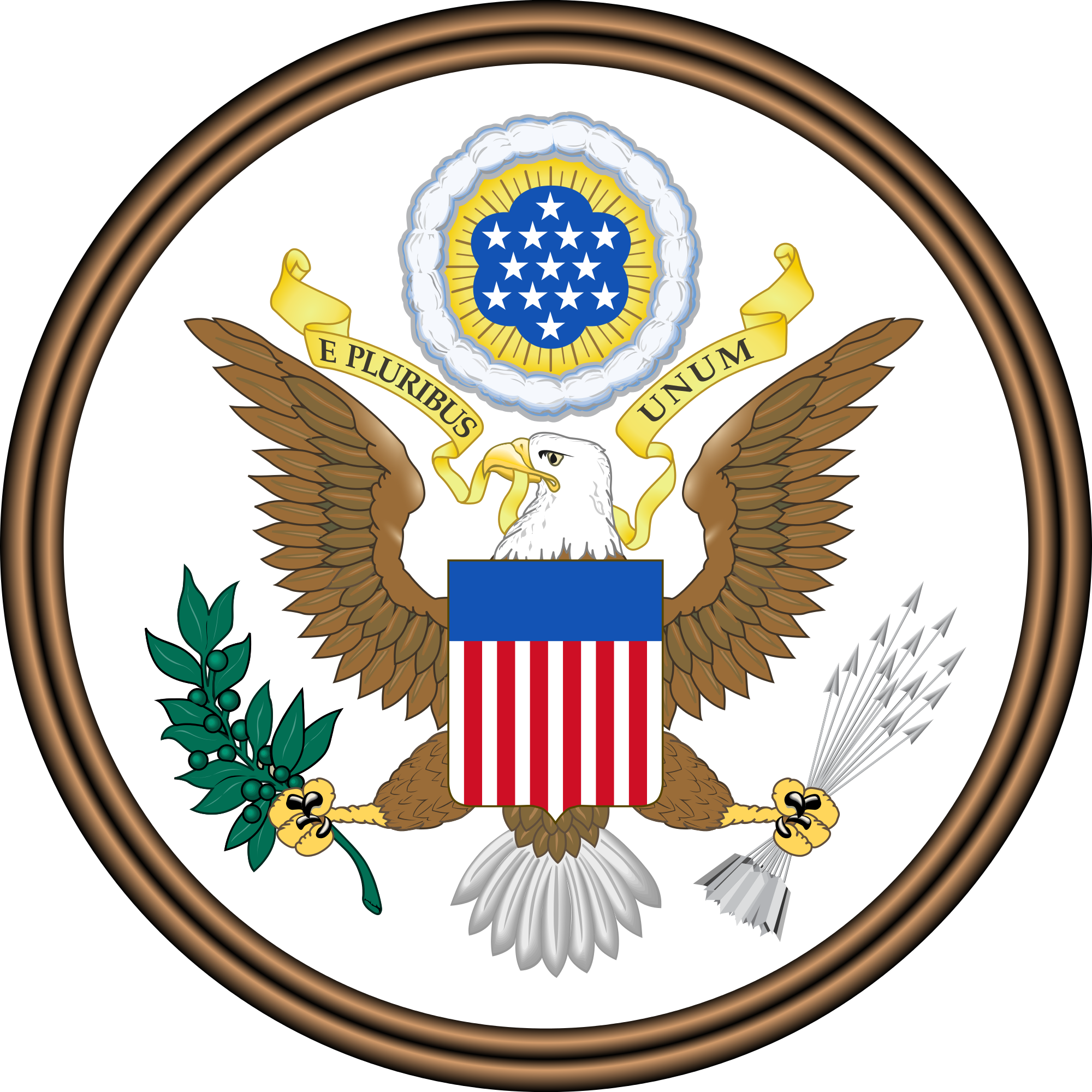Fight to entrench right to boycott

Demonstrators line up outside the White House to protest the visit of Israeli Prime Minister Benjamin Netanyahu today. During the meeting Obama was expected to discuss new aid to Israel with Netanyahu, November 9th, 2015. Photo by AFP/Getty
ACLU free speech case challenges law aimed at anti-Israel boycotts
Kansas law requires contractors to sign document promising not to boycott Israel
By American Civil Liberties Union
October 11, 2017
TOPEKA, Kan. — The American Civil Liberties Union filed a federal lawsuit today arguing that a Kansas law requiring a high school educator to certify that she won’t boycott Israel violates her First Amendment rights.
The law, which took effect on July 1, requires that any person or company that contracts with the state submit a written certification that they are “not currently engaged in a boycott of Israel.”
The Supreme Court ruled decades ago that political boycotts are protected by the First Amendment, and other decisions have established that the government may not require individuals to sign a certification regarding their political expression in order to obtain employment, contracts, or other benefits.
“The First Amendment prohibits the government from using its financial leverage to impose an ideological litmus test,” said ACLU attorney Brian Hauss. “This law is an unconstitutional attempt by the government to silence one side of a public debate by coercing people not to express their beliefs, including through participation in a political boycott.”
The ACLU represents Esther Koontz, who belongs to the Mennonite Church USA. In accordance with calls for boycott made by members of her congregation and her church, Koontz decided not to buy consumer products made by Israeli companies and international companies operating in Israeli settlements in the occupied Palestinian territories. Koontz participates in this boycott in order to protest the Israeli government’s treatment of Palestinians and to pressure the country to change its policies.
Having served as a public school math teacher for nine years, Koontz now develops her school’s math curriculum and trains teachers on how to implement it. She is also qualified to train teachers statewide as a contractor with the Kansas Department of Education’s Math and Science Partnerships program. When Koontz was asked to certify that she does not participate in a boycott of Israel, she said that she could not sign the form in good conscience. As a result, the state refuses to contract with her, and she is unable to participate as a trainer in the state’s programme.

Americans assert their right to boycott here demonstrating outside the offices of New York Gov. Andrew Cuomo protesting against his executive order calling for New York companies to divest from organizations that support the BDS movement, June 9, 2016. Photo by Erik McGregor/Pacific Press/ LightRocket/Getty Images
“You don’t need to share my beliefs or agree with my decisions to understand that this law violates my free speech rights. The state should not be telling people what causes they can or can’t support,” Koontz said. “I’m disappointed that I can’t be a math trainer for the state of Kansas because of my political views about human rights across the globe.”
The Kansas law is similar to legislation that has been passed in other states. The ACLU does not take a position on boycotts of foreign countries, but the organization has long supported the right to participate in political boycotts and has voiced opposition to bills that infringe on this important First Amendment right.
Today’s lawsuit argues that the Kansas law violates the First Amendment for several reasons: it compels speech regarding protected political beliefs, associations, and expression; restricts the political expression and association of government contractors; and discriminates against protected expression based on its content and viewpoint. The lawsuit asks the court to strike down the law and bar the Kansas Department of Education from requiring contractors to certify that they are not participating in boycotts of Israel.
In July, the ACLU sent a letter to members of Congress opposing a bill that would make it a felony to support certain boycotts of companies doing business in Israel and its settlements in the occupied Palestinian territories. As a result, Senate sponsors of the bill are considering changes.

The right to boycott was confirmed by the Supreme Court in 1982 in the National Association for the Advancement of Colored People v. Claiborne Hardware Co.
First Amendment:
Congress shall make no law respecting an establishment of religion, or prohibiting the free exercise thereof; or abridging the freedom of speech, or of the press; or the right of the people peaceably to assemble, and to petition the government for a redress of grievances.
In America, the Right to Boycott Israel Is Under Threat. This Is Why That’s Cause for Concern
McCarthy era anti-Communist loyalty tests have been relegated to the dustbin of history. The same must apply to government requests that employees certify they’re not engaged in a boycott of Israel
By Brian Hauss, Haaretz opinion
October 11, 2017
The First Amendment squarely protects the right to boycott. Lately, though, a legislative assault on that right has been spreading through the United States – designed to stamp out constitutionally protected boycotts of Israel.
In a landmark decision from 1982, the Supreme Court ruled that an NAACP boycott of white-owned businesses in Mississippi, to protest at segregation and racial injustice, was a protected form of free association and free expression. As the court recognized, political boycotts empower individuals to collectively express their dissatisfaction with the status quo and advocate for political, social, and economic change. These are precisely the freedoms the Constitution is meant to protect.
Yet over the past several years, state and federal legislatures have considered dozens of bills, and in some cases passed laws, in direct violation of this important ruling. These bills and laws vary in numerous respects, but they share a common goal of scaring people away people from participating in boycotts meant to protest at Israeli government policies, including what are known as Boycott, Divestment, and Sanctions (BDS) campaigns.
Today, the ACLU filed a lawsuit challenging one of those laws — a Kansas statute requiring state contractors to sign a statement certifying that they do not boycott Israel, including boycotts of companies profiting off settlements in the occupied Palestinian territories.
People have very strong feelings on all sides of this issue. The ACLU takes no position for or against campaigns to boycott Israel or any other foreign country, but we have long defended the right to participate in political boycotts. We must do so again.
We are representing a veteran maths teacher and trainer from Kansas who was told she would need to sign the certification statement in order to participate in a state programme training other math teachers. Our client is a member of the Mennonite Church USA. In response to calls for boycott by the church and members of her congregation, she has decided not to buy consumer goods and services offered by Israeli companies and international companies operating in Israeli settlements in the occupied Palestinian territories. Our client is boycotting to protest at the Israeli government’s treatment of Palestinians and to pressure the government to change its policies.
Earlier this year, our client was selected to participate as a contractor in a statewide training programme run by the Kansas Department of Education. She was excited to use her skills to help train maths teachers throughout the state, but when she was presented with a form requiring her to certify that she “is not currently engaged in a boycott of Israel,” she told the state that she could not sign the form in good conscience. As a result, the state refuses to let her participate in the programme.
Kansas’s law and others like it violate the Constitution. The First Amendment prohibits the government from suppressing one side of a public debate. That means it cannot impose ideological litmus tests or loyalty oaths as a condition on hiring or contracting.
 This principle was famously tested in the McCarthy [L] era, when many state laws required government employees to declare they were not members of the Communist Party or other “subversive groups” in order to keep their jobs. The ACLU successfully challenged many of those laws on constitutional grounds, and anti-Communist loyalty tests have been mostly relegated to the dustbin of history.
This principle was famously tested in the McCarthy [L] era, when many state laws required government employees to declare they were not members of the Communist Party or other “subversive groups” in order to keep their jobs. The ACLU successfully challenged many of those laws on constitutional grounds, and anti-Communist loyalty tests have been mostly relegated to the dustbin of history.
The same rule applies when the government asks someone to certify that they are not engaged in a boycott of Israel.
Kansas should not be dictating political orthodoxy for its contractors. Although the government may impose reasonable restrictions on employee or contractor speech when it relates to their job duties or causes disruption in the workplace, people do not lose the right to participate in politics or speak out on issues of public concern just because they get paid by the state.
By requiring all state contractors to certify that they are not engaged in a boycott of Israel, Kansas’s law unconstitutionally disqualifies people from working for the state based on protected expression and association that has nothing to do with their jobs.
From the Boston Tea Party to the Montgomery bus boycott to the campaign to divest from businesses operating in apartheid South Africa, political boycotts have been a proud part of this country’s constitutional tradition.
That’s why the ACLU has opposed anti-boycott bills in state legislatures for the past several years. That’s why we’ve come out against the Israel Anti-Boycott Act in Congress. And that’s why we’re suing to challenge Kansas’s unconstitutional anti-boycott law.
Brian Hauss is a staff attorney with the American Civil Liberties Union’s Speech, Privacy, and Technology Project. He focuses on free speech issues. Twitter: @brianmhauss
